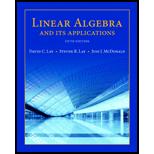
Exercises 31 and 32 reveal an important connection between linear independence and linear transformations and provide practice using the definition of linear dependence. Let V and W be
32. Suppose that T is a one-to-one transformation, so that an equation T(u) = T(v) always implies u = v. Show that if the set of images {T(v1),…,T(vp)} is linearly dependent, then {v1,..., vp} is linearly dependent. This fact shows that a one-to-one linear transformation maps a linearly independent set onto a linearly independent set (because in this case the set of images cannot be linearly dependent).
Want to see the full answer?
Check out a sample textbook solution
Chapter 4 Solutions
Linear Algebra and Its Applications (5th Edition)
Additional Math Textbook Solutions
Elementary & Intermediate Algebra
Calculus: Early Transcendentals (2nd Edition)
College Algebra (Collegiate Math)
Precalculus: Mathematics for Calculus (Standalone Book)
APPLIED STAT.IN BUS.+ECONOMICS
Elementary Algebra: Concepts and Applications (10th Edition)
- A vacant lot is being converted into a community garden. The garden and a walkway around its perimeter have an area of 690 square feet. Find the width of the walkway (x) if the garden measures 14 feet wide by 18 feet long. Write answer to 2 decimal places. (Write the number without units). Hint: add 2x to each of the garden dimensions of 14 x 18 feet to get the total area for the length multiplied by width.arrow_forwardSolve x-1 x+2 = 12 3 4 Your Answer: Answerarrow_forwardFind the solutions to the following equation 21x²+5x=6 ○ a) -3/7, 3/2 ☐ b) -2/3, 3/7 ○ c) -7/3, 3/2 ○ d) -2/3, 7/3arrow_forward
- Listen Solve the quadratic equation. Write the one solution, do not write x =. 2 x²+6x+9= 0 বarrow_forwardSolve the rational equation 14 1 + x-6 x x-7 x-7 ○ a) x = 1, x = 8 ○ b) x = 1 ○ c) x = 7 ○ d) x = 1, x = 7arrow_forwardSolve the absolute inequality | x + 5 > 3 ○ a) (-∞, -8] U[-2, ∞0) ☐ b) (-8, -2) c) (-2, ∞0) ○ d) (-∞, - 8) U(-2, ∞0)arrow_forward
- 1) Listen Describe the error in the problem X 3 X x 3 - 2 = 25x = 0 25x 25 x = ±5arrow_forwardA falling object travels a distance given by the formula d = 6t + 7t² where d is in feet and t is the time in seconds. How many seconds will it take for the object to travel 115 feet? Round answer to 2 decimal places. (Write the number, not the units). Your Answer:arrow_forwardListen Solve the quadratic equation. Write the smaller answer first. 2 Xx - 5x = 24 x = Α x =arrow_forward
- Solve the absolute equation |2x = 4| = 10 ○ a) x = -7, x = 3 ○ b) x = -2, x = 6 ○ c) x = -3, x = 7 ○ d) x = 7arrow_forwardFind a rational inequality that has the solution set (-2, 5] О a) x-5 x+2 b) x+5 x-2 ΛΙ ≥ 0 < 0 VI О c) x-5 x+2 ≤0 VI ○ d) x +2 x-5 <0arrow_forward1) Listen Solve the quadratic equation by factoring. One solution is O. Find the other. (Just write the numerical answer, not x =) 2x² + 28x = 0 Your Answer:arrow_forward
 Elementary Linear Algebra (MindTap Course List)AlgebraISBN:9781305658004Author:Ron LarsonPublisher:Cengage Learning
Elementary Linear Algebra (MindTap Course List)AlgebraISBN:9781305658004Author:Ron LarsonPublisher:Cengage Learning Linear Algebra: A Modern IntroductionAlgebraISBN:9781285463247Author:David PoolePublisher:Cengage Learning
Linear Algebra: A Modern IntroductionAlgebraISBN:9781285463247Author:David PoolePublisher:Cengage Learning

